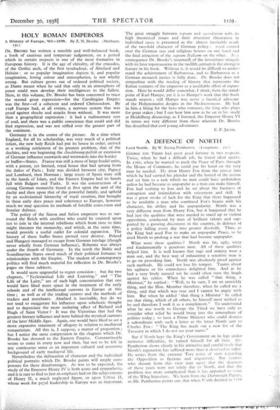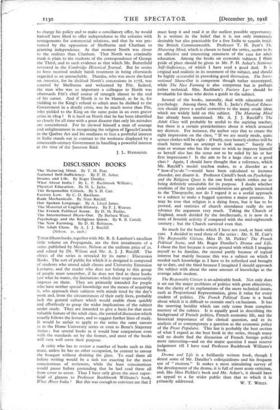A DEFENCE OF NORTH
Lord North. By W. Baring Pemberton. (Longmans. 21s.) GEORGE THE THIRD had great good fortune in two respects. Twice, when he had a difficult job, he found ideal agents. In 1762, when he wanted to push the Peace of Paris through the House of Commons, he could put his hand on the very man he needed. He drew Henry Fox from the retreat into which he had carried his plunder and the hatred of the nation and set him to a task which no man could have undertaken unless he had become as unpopular as a man can make himself. Fox had nothing to lose and he set about the business of corruption and intimidation with enjoyment and skill. It was a great stroke of luck for the King that there happened to be available a man who combined Fox's brains with his character, his ability and his unpopularity. North was a very different man from Henry Fox, but it happened that he had just the qualities that were needed to stand up to violent opposition, conducted by men of brilliant talents and sup- ported by a growing discontent in the country, in defence of a policy falling every day into greater discredit. Thus, as the King had used Fox to make an unpopular Peace, so he used North to prolong a war that had become unpopular.
What were these qualities ? North was fat, ugly, witty and fundamentally a generous man. All of these qualities helped him. It is well known that rage and anxiety wear a man out, and the best way of exhausting a sensitive man is to go on provoking him. North was absolutely proof against such methods. He could not lose his temper. Taunts about his ugliness or his somnolence delighted him. And as he had a very lively natural wit he could often turn the laugh against his critics. When he was called "that thing, a Minister," he replied : "Well, to be sure, I am an unwieldy thing, and the Hon. Member therefore, when he called me a thing, said that which was true and I cannot be .angry with him. But when he added 'that thing a Minister' he called me that thing, which of all others, he himself most wished to be and therefore I took it as a compliment." To understand what he was worth to George the Third we have only to consider what relief he would bring into the atmosphere of politics today ; to have a Prime Minister who could dismiss a subordinate with such a letter as the letter North sent to Charles Fox : "The King has made out a new list of the Treasury in which I do not see your name."
But if North kept the King's Government on its legs under immense difficulties, he ruined himself for all time. Mr. Pemberton shows clearly in his attractive and careful study that North's reputation has suffered more than it deserved to suffer. He writes from the extreme Tory point of view regarding the Opposition as factious and unpatriotic. But readers who dissent from this view may agree that the disasters of those years were not solely due to North, and that the problem was more complicated than it has appeared to scine of the Whig historians. We learn from the Dartmouth Papers, as Mr. Pemberton points out, that when Nqrth decided in 7778
to change his policy and to make a conciliatory offer, he would himself have liked to offer independence to the colonies with arrangements for commercial relations, and that he was pre- vented by the opposition of Shelburne and Chatham to granting independence. At that moment North was closer to the realities than Chatham. That North was criminally weak is plain to the students of the correspondence of George the Third, and to such evidence as that which Mr. Butterfield reviewed in the Cambridge Historical Journal. But he seems to have received unduly harsh treatment in being afterwards regarded as an untouchable. Dtmdas, who was more die-hard on America, for he disliked North's concessions in 1778, was courted by Shelburne and welcomed by Pitt. Indeed, the man who was so important a colleague to North was afterwards Pitt's chief source of strength almost to the end of his career. And if North is to be blamed, as he is, for Yielding to the King's refusal to admit men he disliked to the Government in a deadly crisis, was he much worse than Pitt, who yielded to the King on the same point in an even graver crisis in 1804? It is hard on North that he has been identified so closely for all time with a great disaster that only his mistakes are remembered. For he showed himself a man of courage and enlightenment in recognising the religion of Fiench Canada in the Quebec Act and his readiness to face a powerful interest in India stands out in contrast to the weakness displayed by a nineteenth-century Government in handling a powerful interest at the time of the Jameson Raid.
J. L. HAMMOND.



































 Previous page
Previous page